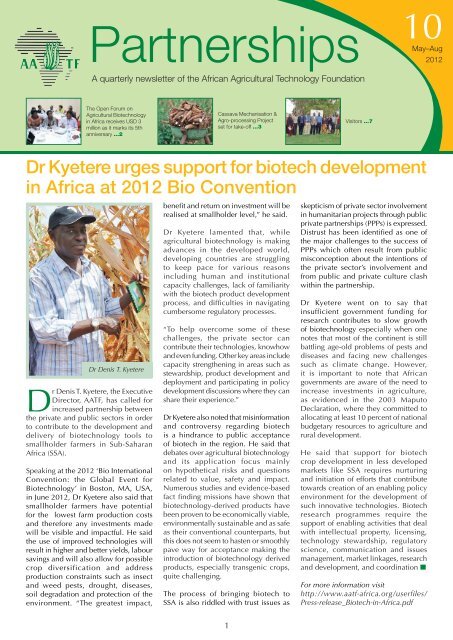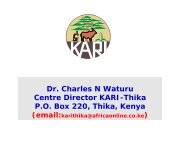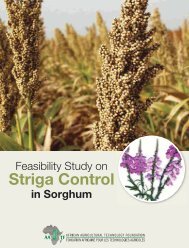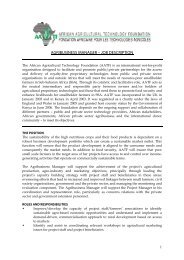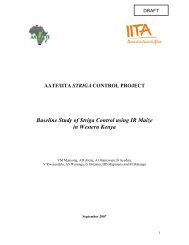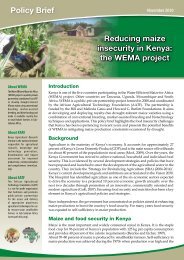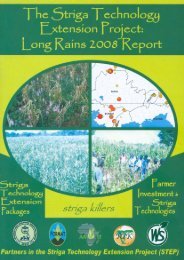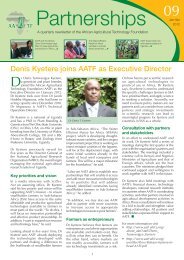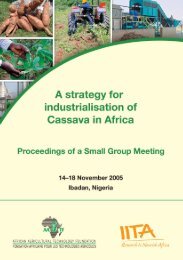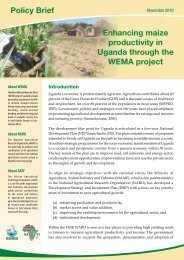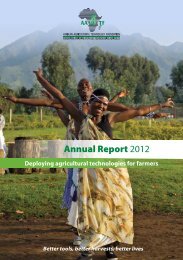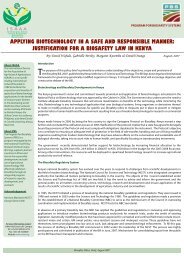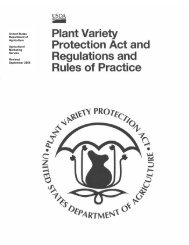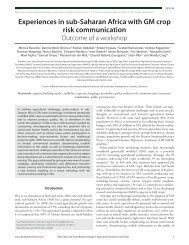Partnerships Issue 10 - African Agricultural Technology Foundation
Partnerships Issue 10 - African Agricultural Technology Foundation
Partnerships Issue 10 - African Agricultural Technology Foundation
You also want an ePaper? Increase the reach of your titles
YUMPU automatically turns print PDFs into web optimized ePapers that Google loves.
<strong>Partnerships</strong><br />
<strong>10</strong><br />
May–Aug<br />
2012<br />
A quarterly newsletter of the <strong>African</strong> <strong>Agricultural</strong> <strong>Technology</strong> <strong>Foundation</strong><br />
The Open Forum on<br />
<strong>Agricultural</strong> Biotechnology<br />
in Africa receives USD 3<br />
million as it marks its 5th<br />
anniversary ...2<br />
Cassava Mechanisation &<br />
Agro-processing Project<br />
set for take-off ...3<br />
Visitors ...7<br />
Dr Kyetere urges support for biotech development<br />
in Africa at 2012 Bio Convention<br />
Dr Denis T. Kyetere<br />
Dr Denis T. Kyetere, the Executive<br />
Director, AATF, has called for<br />
increased partnership between<br />
the private and public sectors in order<br />
to contribute to the development and<br />
delivery of biotechnology tools to<br />
smallholder farmers in Sub-Saharan<br />
Africa (SSA).<br />
Speaking at the 2012 ‘Bio International<br />
Convention: the Global Event for<br />
Biotechnology’ in Boston, MA, USA,<br />
in June 2012, Dr Kyetere also said that<br />
smallholder farmers have potential<br />
for the lowest farm production costs<br />
and therefore any investments made<br />
will be visible and impactful. He said<br />
the use of improved technologies will<br />
result in higher and better yields, labour<br />
savings and will also allow for possible<br />
crop diversification and address<br />
production constraints such as insect<br />
and weed pests, drought, diseases,<br />
soil degradation and protection of the<br />
environment. “The greatest impact,<br />
benefit and return on investment will be<br />
realised at smallholder level,” he said.<br />
Dr Kyetere lamented that, while<br />
agricultural biotechnology is making<br />
advances in the developed world,<br />
developing countries are struggling<br />
to keep pace for various reasons<br />
including human and institutional<br />
capacity challenges, lack of familiarity<br />
with the biotech product development<br />
process, and difficulties in navigating<br />
cumbersome regulatory processes.<br />
“To help overcome some of these<br />
challenges, the private sector can<br />
contribute their technologies, knowhow<br />
and even funding. Other key areas include<br />
capacity strengthening in areas such as<br />
stewardship, product development and<br />
deployment and participating in policy<br />
development discussions where they can<br />
share their experience.”<br />
Dr Kyetere also noted that misinformation<br />
and controversy regarding biotech<br />
is a hindrance to public acceptance<br />
of biotech in the region. He said that<br />
debates over agricultural biotechnology<br />
and its application focus mainly<br />
on hypothetical risks and questions<br />
related to value, safety and impact.<br />
Numerous studies and evidence-based<br />
fact finding missions have shown that<br />
biotechnology-derived products have<br />
been proven to be economically viable,<br />
environmentally sustainable and as safe<br />
as their conventional counterparts, but<br />
this does not seem to hasten or smoothly<br />
pave way for acceptance making the<br />
introduction of biotechnology derived<br />
products, especially transgenic crops,<br />
quite challenging.<br />
The process of bringing biotech to<br />
SSA is also riddled with trust issues as<br />
skepticism of private sector involvement<br />
in humanitarian projects through public<br />
private partnerships (PPPs) is expressed.<br />
Distrust has been identified as one of<br />
the major challenges to the success of<br />
PPPs which often result from public<br />
misconception about the intentions of<br />
the private sector’s involvement and<br />
from public and private culture clash<br />
within the partnership.<br />
Dr Kyetere went on to say that<br />
insufficient government funding for<br />
research contributes to slow growth<br />
of biotechnology especially when one<br />
notes that most of the continent is still<br />
battling age-old problems of pests and<br />
diseases and facing new challenges<br />
such as climate change. However,<br />
it is important to note that <strong>African</strong><br />
governments are aware of the need to<br />
increase investments in agriculture,<br />
as evidenced in the 2003 Maputo<br />
Declaration, where they committed to<br />
allocating at least <strong>10</strong> percent of national<br />
budgetary resources to agriculture and<br />
rural development.<br />
He said that support for biotech<br />
crop development in less developed<br />
markets like SSA requires nurturing<br />
and initiation of efforts that contribute<br />
towards creation of an enabling policy<br />
environment for the development of<br />
such innovative technologies. Biotech<br />
research programmes require the<br />
support of enabling activities that deal<br />
with intellectual property, licensing,<br />
technology stewardship, regulatory<br />
science, communication and issues<br />
management, market linkages, research<br />
and development, and coordination n<br />
For more information visit<br />
http://www.aatf-africa.org/userfiles/<br />
Press-release_Biotech-in-Africa.pdf<br />
1
The Open Forum on <strong>Agricultural</strong><br />
Biotechnology in Africa receives USD 3 million<br />
as it marks its 5th anniversary<br />
OFAB Programming Committee members during the review and planning meeting held in Accra, Ghana in May 2012.<br />
The Open Forum on <strong>Agricultural</strong> Biotechnology in Africa<br />
(OFAB) marked its 5 th anniversary since it was launched<br />
in September 2006. The celebration, which also<br />
saw long-serving country organising committee members<br />
recognised for dedicated service, was held alongside the<br />
Forum’s 2012 annual review and planning meeting in Accra,<br />
Ghana from 1–3 May 2012. The meeting brought together<br />
representatives from the five <strong>African</strong> countries of Kenya,<br />
Uganda, Nigeria, Tanzania and Ghana. The Forum aims to<br />
enhance knowledge-sharing and awareness on biotechnology<br />
and to contribute to building an enabling environment for<br />
decision making on agricultural biotechnology in Africa.<br />
“Biotechnology has delivered substantial benefits to farmers<br />
around the world but Africa still lags behind in exploiting<br />
its potential partly due to lack of an enabling environment<br />
for the development and use of agricultural biotechnology,”<br />
said Hon Sherry Ayittey, Ghana’s Minister for Environment,<br />
Science and <strong>Technology</strong> who was the guest of honour during<br />
the celebration.<br />
The Minister went on to say that discussions over agricultural<br />
biotechnology and its application are surrounded by<br />
misperceptions due to lack of or conflicting information.<br />
“This is a challenge that decision makers who must make the<br />
right decisions in the face of a rapidly growing population,<br />
declining agricultural productivity and reduced resources<br />
available for agricultural research continue to face,” she<br />
added.<br />
Dr Kyetere, the Executive Director of AATF, said that OFAB<br />
addresses the existing biotechnology information gaps and<br />
concerns by facilitating the interaction of scientists involved<br />
in biotechnology research with journalists, policy makers,<br />
civil society, farmers and other stakeholders.<br />
Partners from the five countries lauded the Bill & Melinda<br />
Gates <strong>Foundation</strong> for supporting the program through a grant<br />
of USD 3 million in March 2012. The additional funding will<br />
support the current activities of OFAB in the countries and<br />
also expand activities outside their current monthly meetings<br />
to cover a wider geographical scope and organise targeted<br />
biotech communication events for specific categories of<br />
stakeholders. The Forum will also open another country<br />
chapter in a francophone country before the end of 2012.<br />
Currently, OFAB, an initiative of AATF, operates through<br />
holding monthly meetings in five countries (Kenya, Tanzania,<br />
Uganda, Nigeria and Ghana), where topics of interest in<br />
agricultural biotechnology are presented and discussed.<br />
Lessons and experiences gained during the five years that<br />
OFAB has been in operation point to the potential that OFAB<br />
offers in creating better understanding and appreciation of<br />
agricultural biotechnology in SSA to address biotechnology<br />
information needs of policy makers and the general public n<br />
For more information visit<br />
http://www.aatf-africa.org/news__events/press_releases/en/<br />
http://www.ofabafrica.org/links.php?id=17<br />
or contact Nancy Muchiri (n.muchiri@aatf-africa.org)<br />
2
Project updates<br />
Cassava Mechanisation and Agro-processing Project set for take-off<br />
Smallholder farmers in Sub-Saharan<br />
Africa (SSA) who produce more<br />
than half of the world’s supply of<br />
cassava are set to benefit from access<br />
to improved cassava varieties and high<br />
quality processing equipment with the<br />
initiation of a new project known as<br />
the Cassava Mechanisation and Agroprocessing<br />
Project (CAMAP) being<br />
implemented by AATF.<br />
One of the constraints to cassava<br />
production in the region is lack of<br />
appropriate machinery for planting,<br />
harvesting and processing, yet the<br />
potential for increasing the productivity<br />
of the crop is huge with over 300<br />
possible cassava products.<br />
The objective of the project is to ensure<br />
food security and poverty reduction<br />
by improving the mechanisation and<br />
agro-processing of cassava along the<br />
value chain by smallholder farmers<br />
in SSA. Cassava production and<br />
processing technologies will contribute<br />
to sustainable improvements in market<br />
access, food security, and enhance<br />
incomes and livelihoods of farmers,<br />
processors, and marketers in the cassava<br />
sector. The project will work with<br />
partners to develop competitive cassava<br />
commodity chains for a reliable supply<br />
of processed products for food and<br />
non-food industrial use by upgrading<br />
and expanding traditional planting,<br />
harvesting and processing techniques<br />
in selected countries in Africa.<br />
The project is set to benefit more than 3.5<br />
million smallholder farmers in Nigeria,<br />
Ghana, Malawi, Zambia and Uganda. The<br />
specific objectives of the project are to;<br />
negotiate access and transfer of cassava<br />
mechanisation and agro processing<br />
technologies for use by smallholder<br />
farmers; increase cassava production<br />
through mechanisation across the entire<br />
value chain and thus reduce post-harvest<br />
losses and demands for intensive labour;<br />
add value to the cassava industry through<br />
value addition and creation of market<br />
linkages by linking smallholder farmers<br />
with agro processing centers; and build<br />
capacity of local entrepreneurs to design<br />
prototypes machines, manufacture,<br />
maintain and repair the necessary<br />
equipment for cassava planting, harvesting<br />
and processing.<br />
Over the last five years, AATF has been<br />
exploring various possibilities towards<br />
improving the viability of cassava<br />
production through mechanisation<br />
and agro-processing. AATF has engaged<br />
with the various cassava processing<br />
equipment manufacturers to work<br />
directly with <strong>African</strong> entrepreneurs to<br />
produce high quality cassava planting<br />
and processing equipment.<br />
“Manufacturers from Brazil, one of<br />
the world’s leading cassava producers<br />
have agreed to work with AATF to<br />
give farmers access to high quality<br />
cassava processing equipment” says<br />
Mr George Marechera, the Business<br />
Development Manager at AATF. “We<br />
have also engaged with cassava farmers,<br />
processors, government departments<br />
and research organisations in Nigeria<br />
and Zambia, the target pilot countries<br />
A cassava farmer with her produce - the<br />
CAMAP project is set to benefit more<br />
than 3.5 million smallholder farmers in<br />
five target countries of Nigeria, Zambia,<br />
Uganda, Malawi and Kenya.<br />
for the project, to understand the cassava<br />
sector and also identify potential project<br />
partners.”<br />
The cassava equipment being targeted by<br />
the project includes planters, cultivators,<br />
boom sprayers, stem cutters, diggers,<br />
washers and peelers, graters, driers and<br />
among others. AATF will facilitate and<br />
coordinate mechanization at farm level<br />
and link farmers to service providers and<br />
fabricators in the project n<br />
For more information contact George<br />
Marechera (g.marechera@aatf-africa.<br />
org)<br />
Compliance management training for<br />
cowpea and rice projects held<br />
A<br />
training on confined field trials (CFT) compliance<br />
management was held in Accra, Ghana, in July 2012, to<br />
enhance the capacity of teams responsible for managing<br />
the Maruca Resistant Cowpea and Nitrogen Efficient Water<br />
Efficient Salt Tolerant (NEWEST) Rice projects CFTs in Ghana,<br />
Burkina Faso and Nigeria.<br />
The training, which also included the sharing of CFT compliance<br />
management experiences from the Cowpea project in Nigeria<br />
and Burkina Faso, was especially useful to the teams in Ghana,<br />
who are preparing to install the first CFTs for the cowpea and<br />
rice projects as soon as regulatory approval is given by the<br />
country’s National Biosafety Committee. Nigeria and Burkina<br />
Faso are in the process of conducting the fourth and second<br />
Cowpea CFTs respectively n<br />
Participants during the compliance training held in Accra in July<br />
2012<br />
For more information contact Francis Nang’ayo (f.nang’ayo@<br />
aatf-africa.org)<br />
3
PICTURE SPEAK<br />
Hon Sherry Ayittey, Ghana’s Minister for Environment, Science and <strong>Technology</strong> and Dr Denis Kyetere, AATF<br />
Executive Director, unveil the OFAB logo during the Forum’s 5th Anniversary celebrations held in Accra, Ghana in<br />
May 2012.<br />
Hon Akinwumi Adesina, Nigeria’s Minister for Agriculture and Rural Development (third left) and Dr Denis<br />
Kyetere ( third right) with AATF Nigeria staff in a group photo during a courtesy call paid on the Minister in May<br />
2012 in Abuja, Nigeria.<br />
Participants pose for a group photo during the AATF Strategy Refresh meeting held in May 2012 in Nairobi. The<br />
meeting was attended by over 30 participants who included representatives from USAID, CIMMYT, ASARECA, a<br />
farmer organisation, and Ministry of Agriculture, Kenya.
PICTURE SPEAK<br />
Mr Isaka Mashauri, the Director, Tanseed International talks to journalists at the Imazapyr Resistant maize<br />
demonstration plot in Morogoro in August 2012.<br />
Farmers attending a field day in Tanga, Tanzania read information materials on how to control Striga on their Farms.<br />
Dr Charity Mutegi explains how the aflasafeKE01 biocontrol product works to reduce aflatoxin contamination in<br />
maize to farmers in Embu district, Kenya in June 2012, during the initiation of on-farm trials for the product under<br />
the Aflatoxin Control in Maize and Peanuts project.
Project updates (continued)<br />
Progress and planning meeting held for Bacterial Wilt Resistant Banana project<br />
Partners working on the Bacterial<br />
Wilt Resistant Banana project met<br />
in July 2012 in Kampala to review<br />
progress made and also plan for 2012<br />
and 2013 activities. The project, which<br />
is a partnership between AATF, National<br />
<strong>Agricultural</strong> Research Organisation of<br />
Uganda and the International Institute<br />
of Tropical Agriculture is developing<br />
banana varieties that are resistant to the<br />
banana bacterial wilt disease from East<br />
<strong>African</strong> farmer preferred germplasm.<br />
During the meeting, scientists working<br />
on the project reported that their<br />
endeavors have generated several lines<br />
of the apple banana popularly known as<br />
sukali ndizi that have shown resistance to<br />
the disease after being inserted with two<br />
genes extracted from sweet pepper. The<br />
genes have been donated royalty-free for<br />
use in the project by Academia Sinica,<br />
Taiwan through negotiations by AATF.<br />
The Banana meeting participants during a field trip to the Project’s confined field trial<br />
site in Kawanda, Uganda in July 2012.<br />
The lines are undergoing testing under<br />
confined field trials at the Kawanda<br />
research station in Uganda. The meeting<br />
was also attended by participants drawn<br />
from various research institutes involved<br />
in banana research in Kenya, Tanzania,<br />
Rwanda, Burundi and Uganda n<br />
For more information contact Jacob<br />
Mignouna (h.mignouna@aatf-africa.org)<br />
Striga control in maize<br />
project holds partners<br />
meeting and farmer field<br />
days<br />
In an effort to enhance the uptake<br />
and awareness of the use of the<br />
StrigAway Imazapyr Resistant (IR)<br />
maize technology in the control of<br />
the Striga weed, the Striga Control in<br />
Maize project conducted farmer field<br />
days in Kenya in July, and in Uganda and<br />
Tanzania in August 2012 and also held<br />
a strategic partners meeting in Nairobi.<br />
The partners meeting, attended by<br />
representatives from Kenya, Uganda<br />
and Tanzania including seed companies<br />
reviewed the status of the project since its<br />
launch in 2006, identified the challenges<br />
and lessons learnt and possible solutions.<br />
They also shared and discussed plans for<br />
the 2012 short rains season and the 2013<br />
seasons. Plans were also made on seed<br />
production to ensure availability during<br />
the planting seasons.<br />
The farmer field days in Western<br />
Kenya held under the Integrated Striga<br />
Management for Africa project were<br />
attended by over 200 farmers and were<br />
held in six districts. Farmers attending<br />
the field day were taken through the<br />
various Striga control technologies<br />
including the IR maize technology.<br />
Mama Anisia Maiko (center) displays a StrigAway Imazapyr Resistant maize cob at her<br />
demonstration plot during a farmer field day held in, Tanga, Tanzania in August 2012.<br />
In Tanzania, the farmer field day was<br />
held in Muheza in Tanga region. The<br />
field day was attended by over 200<br />
participants including farmers, extension<br />
officers and officials from the Ministry of<br />
Agriculture and partners involved in the<br />
project including Tanseed International<br />
Ltd, International Maize and Wheat<br />
Improvement Center (CIMMYT), BASF<br />
and AATF.<br />
During the field day, two farmers who<br />
had participated in demonstrations<br />
for the IR maize seed variety TAN 222<br />
were given an opportunity to share their<br />
experiences with other farmers. Both<br />
testified that the variety was effective in<br />
reducing the Striga weed infestation on<br />
their farm.<br />
In Uganda, a field day was held to<br />
evaluate the performance of 40 different<br />
IR maize varieties in Osukuru sub-county,<br />
Tororo district. The over 40 participants<br />
representing seed companies, farmer<br />
groups, local government and project<br />
partners identified three varieties as the<br />
best performing in the control of Striga<br />
in the region. These varieties will be<br />
planted again for further evaluation in<br />
the 2012 second season n<br />
6
Meeting to harmonize bio pesticide regulatory frameworks held<br />
AATF together with the United<br />
States Department of Agriculture<br />
(USDA) organized a roundtable<br />
meeting in June 2012 in Zanzibar,<br />
Tanzania to develop a plan on how<br />
to draft a bio pesticide regulatory<br />
framework. The meeting brought<br />
together regulatory experts from Kenya,<br />
Tanzania, Mozambique and Zambia<br />
as part of an initiative to harmonise<br />
regulatory frameworks for biocontrol<br />
in Sub-Saharan Africa. The experts<br />
were expected to develop guidelines<br />
for regional registration of microbial<br />
bio pesticides drawing from existing<br />
frameworks. The output from the<br />
roundtable discussions will feed into<br />
the Partnership for Aflatoxin Control in<br />
Africa (PACA) initiative which is a multidonor<br />
and multi-institutional Africawide<br />
partnership that is exploring ways<br />
of how to increase investments and<br />
efforts towards aflatoxin control. n<br />
For more information contact Francis<br />
Nang’ayo (f.nang’ayo@aatf-africa.org)<br />
End of phase I review for WEMA done<br />
The Water Efficient Maize for Africa<br />
(WEMA) Project underwent an<br />
end of phase I review in July 2012.<br />
This follows a mid-term review that was<br />
done in August 20<strong>10</strong>. The five -year<br />
Phase I of the project started in March<br />
2008 and will end in February 2013.<br />
The review, which was conducted by Dr<br />
Greg Edmeades and Prof Idah Sithole-<br />
Niang on behalf of the project donors,<br />
Bill and Melinda Gates <strong>Foundation</strong><br />
and the Howard G. Buffet <strong>Foundation</strong>s<br />
included meetings with project team<br />
leaders from the five project countries of<br />
Kenya, Uganda, Tanzania, Mozambique<br />
and South Africa, technology donors,<br />
CIMMYT and Monsanto and the project<br />
coordinator, AATF. Emphasis during the<br />
review was on the progress that has been<br />
made since the last review in August<br />
20<strong>10</strong>, the actions on the 20<strong>10</strong> review<br />
recommendations and the project’s<br />
The reviewers Dr Greg Edmeades and Prof Idah Sithole-Niang (left) present the<br />
preliminary findings of the review to the project partners in Nairobi in July 2012.<br />
preparedness for phase II that will focus<br />
on deployment and commercialization<br />
of both the conventional and transgenic<br />
drought-tolerant and insect-protected<br />
maize varieties that the project has been<br />
developing during phase I. Preliminary<br />
indications from the review show<br />
that the project has met the phase I<br />
objectives n<br />
For more information contact Sylvester<br />
Oikeh (s.oikeh@aatf-africa.org)<br />
Visitors<br />
AATF and Kenya’s Ministry of<br />
Agriculture explore linkages<br />
Representatives from the research<br />
liaison division (RELD) of the Ministry<br />
of Agriculture in Kenya visited AATF<br />
in June 2012 and held discussions with staff<br />
to explore common areas of interest that the<br />
two organisations can collaborate on.<br />
One of the objectives of RELD is to establish<br />
and enhance research-extension linkages<br />
for participatory technology development,<br />
packaging and dissemination in an effort to<br />
achieve synergy through harmonized and<br />
coordinated initiatives n<br />
The Ministry of Agriculture (left) officials Agnes Kyalo and Patrick Ochieng, during the<br />
meeting with AATF staff.<br />
7
Bt cotton project team<br />
shares experiences<br />
The Bt cotton project team from<br />
the Kenya <strong>Agricultural</strong> Research<br />
Institute met with AATF staff to share<br />
their experiences in the development<br />
and commercialisation of Bt cotton in<br />
Kenya and to seek collaboration in the<br />
deployment of the product. The team,<br />
led by Dr Charles Waturu, the project’s<br />
principal investigator, also discussed<br />
matters of mutual interest related to<br />
deployment and commercialisation of<br />
biotechnology tools. Bt cotton is expected<br />
to be commercialised in 2014 and may be<br />
the first GM crop in Kenya n<br />
Dr Charles Waturu, the Bt Cotton Principal Investigator from KARI (5 th left) with<br />
AATF staff and some members of his team.<br />
New staff<br />
Prince Addae – Cowpea Project Manager<br />
Dr Prince Addae has joined AATF as the Cowpea Project Manager based in Abuja, Nigeria.<br />
Prince is an agronomist with a PhD from University of Sydney, Australia, an MSc from University<br />
of Guelph, Ontario, Canada and a BSc (Hons) from University of Science & <strong>Technology</strong>, Ghana.<br />
Prince began his career working for Ghana Grains and Legumes Board at Kumasi on Ghana/<br />
Canada Grains Development Project as a Senior Development Officer. He was Principal<br />
Research Officer, Horticulture, for the Ministry of Food and Agriculture, Fiji. Prince worked<br />
for Monsanto Company at St Louis, USA as Geneticist/Breeder from 1998 to 2006 where he<br />
incorporated insect-resistant and Roundup Ready flex traits into cotton varieties from Burkina<br />
Faso leading to Bt cotton commercialisation. He also worked on biotech cotton as Trait Testing<br />
Manager for Bayer Crop Science in 2011 at Lubbock, Texas. Prior to joining AATF Prince was<br />
an International Consultant for United Nations Industrial Organization (UNIDO), Vienna on<br />
biotech cotton for Ghana to revitalise Ghana’s cotton industry n<br />
Prince Addae<br />
For more information on Prince visit http://www.aatf-africa.org/about_aatf/staff/addae<br />
Daniel Otunge - OFAB Coordinator<br />
Daniel Otunge has joined AATF as Coordinator for the Open Forum for <strong>Agricultural</strong><br />
Biotechnology (OFAB) in Africa. Daniel a development communication expert holds a<br />
Master of Arts degree in Philosophy, a Postgraduate Diploma in Mass Communications,<br />
and a Bachelor of Arts degree in Sociology from the University of Nairobi. Daniel is waiting<br />
to graduate with an MA in Development Communication from the University of Nairobi.<br />
Daniel worked for six years as Communication Officer with the International Service for<br />
the Acquisition of Agri-biotech Applications (ISAAA Afri-Center) in Nairobi. Prior to joining<br />
AATF, Daniel was the head of Communication and Advocacy at the <strong>African</strong> Seed Trade<br />
Association (AFSTA). As Coordinator of the Open Forum for <strong>Agricultural</strong> Biotechnology<br />
(OFAB), Daniel is responsible for effective and efficient coordination and management of<br />
OFAB activities in Africa n<br />
For more information on Daniel visit http://www.aatf-africa.org/about_aatf/staff/Otunge<br />
Daniel Otunge<br />
<strong>Partnerships</strong> is a quarterly newsletter published by the <strong>African</strong> <strong>Agricultural</strong> <strong>Technology</strong> <strong>Foundation</strong> (AATF) in Nairobi, Kenya.<br />
Contact: Nancy N. Muchiri, Communications & <strong>Partnerships</strong> Unit, <strong>African</strong> <strong>Agricultural</strong> <strong>Technology</strong> <strong>Foundation</strong>,<br />
P.O. Box 30709-00<strong>10</strong>0, Nairobi, Kenya. Tel. +254 20 422 3700; Fax: +254 20 422 3701; Via USA: Tel. + 1 650 833 6660 3700,<br />
Fax: +1 650 833 6661 3701.<br />
email: aatf@aatf-africa.org. Website: www.aatf-africa.org.<br />
© 2012. AATF encourages fair use of information in this newsletter provided the source is fully acknowledged.<br />
8


